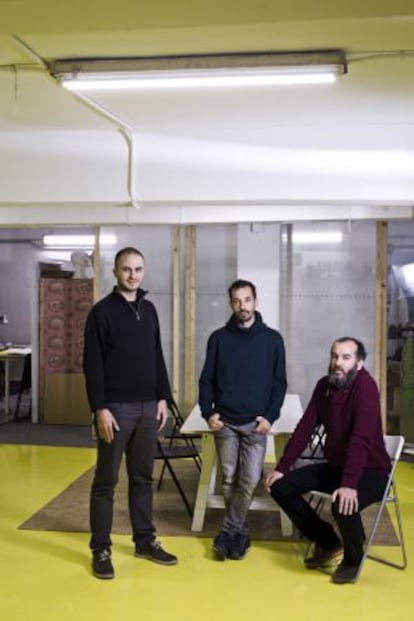Switching the political channels
Parties flock to create online platforms that meet demands for more direct communication


The rules of the game are changing. Spaniards are looking for new ways to engage with their elected representatives and the social networks are no longer enough. Nor are people willing to wait four years until lawmakers ask them for their opinions at the polls.
Last November, the Socialist Party launched MiPSOE, “a place where anyone can register and participate,” says María González Veracruz, head of the party’s online politics and participation department.
“On one hand, citizens can suggest what should be included in our municipal, regional and national platforms. Those suggestions will be passed on to the party’s executive committee. But we also want to establish a direct link between voters and the party, as we feel this has a lot of potential,” she adds.
So far, around 4,000 people have registered at MiPSOE.
Later this month, the Popular Party (PP) is expected to introduce a voter engagement platform app, which, together with the opinions it gathers on the social networks, will be used to determine what people want from their leaders, says Pablo Casado, the PP’s head of citizen participation.
In September, United Left (IU) created a channel for citizens to make proposals to be included in the coalition’s platform. “Participation has always been one of our hallmarks,” said an IU spokesman.
Participation has always been one of our hallmarks” United Left spokesman
Union, Progress and Democracy (UPyD) has also set up its own system to gather grassroots questions for the government.
But new anti-austerity party Podemos has been the most active player in this drive to harness citizens’ ideas for new public policies. Through apps and forums such as Reddit, Loomio and Agora Voting, the party know what its supporters think and demand.
In some of the areas where Podemos has gained strength, 50 percent of its supporters use these apps; in others, however, no one is. But the use of these apps has been on the rise since last March.
Fran Carrillo, of La Fábrica de Discursos, a political consulting firm, says any party that refuses to jump on the bandwagon can stand to lose “as much as 40 percent of potential votes.” “What we are seeing this year is only the beginning of things to come,” he adds.
Juan Quesada, director of consulting firm Mosaiq, says parties can no longer simply rely on polls as they have been doing to date. “More and more people want answers to the issues that concern them,” he says. “Where are we at? Well, it depends on the province. There are those who, out of election pressure, have begun working on solid proposals. But in other areas, where a party has the weight of votes, they think it isn’t really necessary because they are not going to change the final results.”
Parties can no longer just rely on voters’ surveys as they have been doing
Quesada believes that these tools are much more useful for opposition parties than for those in government. Even Casado of the PP agrees: “Voter engagement platforms are much more useful for parties that are not in government. If you try to do this while in government, you draw too much hope that you can accomplish people’s proposals. If someone says that you should make drivers pay tolls on all roads, what should you do?” he asks.
Javier Toret, of the University of Catalonia, says he remains unconvinced by this new trend of citizen participation forums and websites. “A lot of times they foment false participation. You cannot just create an online platform and not do anything with it. You have to be aware of what people are saying,” he says.
December 3: at Medialab, Madrid City Hall’s space for promoting cultural projects, Benjamin Knight, 31, is presenting Loomio, an application from New Zealand used in Podemos circles. In attendance are moderators of some of the party’s groups, a university student and a coordinator for an NGO. The event has been organized by Yago Bermejo, 33, Miguel Arana, 32, and Carlos Barragán, 30, a trio of physicists involved in the 15-M popular protest movement who three years ago created Labodemo (short for Laboratorio Democrático, or democratic laboratory), which puts programmers in contact with those who might be interested in using them. They first presented the benefits of these applications to green party Equo, but nothing ever took root. After that, they offered it to the Juventud Sin Futuro platform and later got in contact with the Podemos participation team.
These sites might be more useful for opposition parties rather than for those who are in government
Despite the wave of citizen engagement sites, Spain is far behind in introducing such platforms in comparison with other countries, says Toret. One site that has gained notice is Oviedo Decide, which was introduced by the PP in Asturias and gives citizens a direct line to Oviedo City Hall. Around 11,000 people are registered and their opinions and suggestions vary – from more dog runs to stricter closing hours for street cafés.
Pia Mancini, spokeswoman for the Argentinean group Democracia en Red (or Online democracy), believes that people need to start using new technologies to improve their own democracies “or else in the future there is going to be a conflict between a system that only asks us to participate once every four years and a citizenry that is getting used to representing itself.”
Tu suscripción se está usando en otro dispositivo
¿Quieres añadir otro usuario a tu suscripción?
Si continúas leyendo en este dispositivo, no se podrá leer en el otro.
FlechaTu suscripción se está usando en otro dispositivo y solo puedes acceder a EL PAÍS desde un dispositivo a la vez.
Si quieres compartir tu cuenta, cambia tu suscripción a la modalidad Premium, así podrás añadir otro usuario. Cada uno accederá con su propia cuenta de email, lo que os permitirá personalizar vuestra experiencia en EL PAÍS.
¿Tienes una suscripción de empresa? Accede aquí para contratar más cuentas.
En el caso de no saber quién está usando tu cuenta, te recomendamos cambiar tu contraseña aquí.
Si decides continuar compartiendo tu cuenta, este mensaje se mostrará en tu dispositivo y en el de la otra persona que está usando tu cuenta de forma indefinida, afectando a tu experiencia de lectura. Puedes consultar aquí los términos y condiciones de la suscripción digital.








































